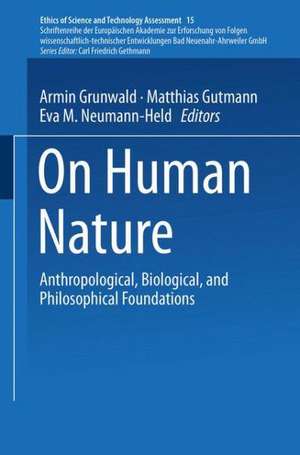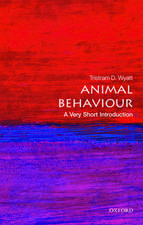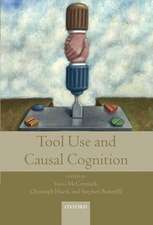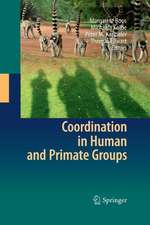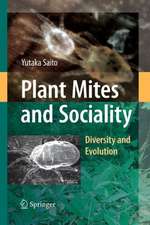On Human Nature: Anthropological, Biological, and Philosophical Foundations: Ethics of Science and Technology Assessment, cartea 15
F. Wütscher Editat de Armin Grunwald, Matthias Gutmann, Eva M. Neumann-Helden Limba Engleză Paperback – 15 apr 2014
Din seria Ethics of Science and Technology Assessment
- 15%
 Preț: 439.70 lei
Preț: 439.70 lei - 18%
 Preț: 796.13 lei
Preț: 796.13 lei -
 Preț: 392.21 lei
Preț: 392.21 lei -
 Preț: 350.12 lei
Preț: 350.12 lei - 5%
 Preț: 368.00 lei
Preț: 368.00 lei - 20%
 Preț: 709.13 lei
Preț: 709.13 lei - 15%
 Preț: 714.02 lei
Preț: 714.02 lei -
 Preț: 478.05 lei
Preț: 478.05 lei -
 Preț: 489.30 lei
Preț: 489.30 lei -
 Preț: 389.70 lei
Preț: 389.70 lei - 15%
 Preț: 469.91 lei
Preț: 469.91 lei - 15%
 Preț: 643.00 lei
Preț: 643.00 lei -
 Preț: 402.98 lei
Preț: 402.98 lei -
 Preț: 393.90 lei
Preț: 393.90 lei -
 Preț: 407.19 lei
Preț: 407.19 lei -
 Preț: 384.86 lei
Preț: 384.86 lei -
 Preț: 386.61 lei
Preț: 386.61 lei -
 Preț: 402.38 lei
Preț: 402.38 lei - 15%
 Preț: 657.73 lei
Preț: 657.73 lei - 18%
 Preț: 747.20 lei
Preț: 747.20 lei - 5%
 Preț: 737.69 lei
Preț: 737.69 lei - 15%
 Preț: 449.83 lei
Preț: 449.83 lei -
 Preț: 384.86 lei
Preț: 384.86 lei - 15%
 Preț: 504.99 lei
Preț: 504.99 lei - 5%
 Preț: 366.70 lei
Preț: 366.70 lei - 5%
 Preț: 724.50 lei
Preț: 724.50 lei - 18%
 Preț: 740.11 lei
Preț: 740.11 lei - 15%
 Preț: 473.49 lei
Preț: 473.49 lei -
 Preț: 405.06 lei
Preț: 405.06 lei
Preț: 386.22 lei
Nou
Puncte Express: 579
Preț estimativ în valută:
73.93€ • 80.33$ • 62.14£
73.93€ • 80.33$ • 62.14£
Carte tipărită la comandă
Livrare economică 21 aprilie-05 mai
Preluare comenzi: 021 569.72.76
Specificații
ISBN-13: 9783642500251
ISBN-10: 3642500250
Pagini: 264
Ilustrații: XX, 241 p. 13 illus.
Dimensiuni: 155 x 235 x 20 mm
Greutate: 0.37 kg
Ediția:2002
Editura: Springer Berlin, Heidelberg
Colecția Springer
Seria Ethics of Science and Technology Assessment
Locul publicării:Berlin, Heidelberg, Germany
ISBN-10: 3642500250
Pagini: 264
Ilustrații: XX, 241 p. 13 illus.
Dimensiuni: 155 x 235 x 20 mm
Greutate: 0.37 kg
Ediția:2002
Editura: Springer Berlin, Heidelberg
Colecția Springer
Seria Ethics of Science and Technology Assessment
Locul publicării:Berlin, Heidelberg, Germany
Public țintă
ResearchCuprins
I The Nature of Human Nature: Ethical and General Issues.- On Human Nature.- Personalistic Organicism and the Human Social Animal.- Genetics, Embodiment and Identity.- II Biology in Discourse: Biotheoretical Considerations on Human Nature.- The Biological Fundamentals of Human Cultural Developments and their Unique Functional Integration.- Three Seconds: A Temporal Platform for Conscious Activities.- Gestalt Recognition and Internal Representation — A Report from the Philosophical Laboratory.- Between Natural Disposition and Cultural Masterment of Life — The Cognitive Sciences and Concept of Man in Conflicting Conceptions of Scienes.- Genotype and Phenotype: Genetic and Epigenetic Aspects.- Genetic Determinism: The Battle between Scientific Data and Social Image in Contemporary Developmental Biology.- Can we find Human Nature in the Human Genome?.- The Nurturing of Natures.- III The Other Side of the Mirror: Methodological Reconsideration of Human Nature.- The Burdon of Proof — On the Impossibility of Technology Assessment for the Human Genome Project.- Philosophy and the Concept of Technology — On the Anthropological Significance of Technology.- Human Cultures’ Natures — Critical Considerations and Some Perspectives of Culturalist Anthropology.
Textul de pe ultima copertă
The question, what does it mean to be human, is as old as philosophy and the sciences. Furthermore, from the very beginning of human history this question for human nature was inextricably interwoven with the question for the nature of nature. Anthropology in this sense was always accompanied by cosmology, and philosophical approaches find and found their counterpart in scientific research. However, although one can clearly identify here a common origin, the systematic relationship between philosophical and scientific considerations on human nature remains nevertheless unclear. This abeyance has led to intensive struggles between both fields of research during the entire history of sciences. Thereby, the general defense and acceptance of positions changed between those, which emphasised more "reductive" and those which stood for more inclusive approaches. Rather then arguing for one or the other side of these alternatives, a third way can be seen in the search for the formulation of a rather integrative perspective. If the goal is such a multi-perspective, transdisciplinary approach, then a discourse must be initiated, which emphasises and structures the discourse between such different disciplines as socio-biology, morphology, evolutionary theory, ethics, philosophy of sciences and epistemology. On the basis of such considerations the Europäische Akademie organised in spring 1999 the symposium "On Human Nature. Biological Approaches and Philosophical Reflections". The main results of this symposium, complemented by the approaches of invited authors, are presented in the current volume of the series "Wissenschaftsethik und Technikfolgenberteilung". The authors and the editors hope to invoke a comprehensive and inclusive discussion on a modern "concept of humankind", for which the results of this books may serve as a transdisciplinary contribution.
Caracteristici
Includes supplementary material: sn.pub/extras
